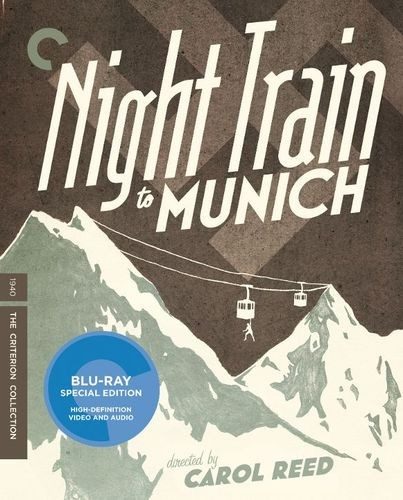Home Video Hovel: Night Train to Munich, by Tyler Smith
Carol Reed’s Night Train to Munich – recently released on Blu-Ray by the Criterion Collection – is a fascinating study in pre-war thinking and filmmaking. This may seem a strange thing to say, given that the film was made while Europe was smack in the middle of World War II. But there is a certain naïveté to the film’s playful nature, which betrays the world’s ignorance to the full monstrosity of Nazi Germany. While the film does acknowledge the Nazis as particularly lethal, one must assume that Reed would have struck a very different tone had the horrors of the Holocaust been widely known. Compare the Hitchcockian quality of the film to Reed’s 1949 masterpiece The Third Man and you’ll see a filmmaker that – like so many others around the world – would come to grips with the true brokenness, heartbreak, and inhumanity of war. This ultimately makes Night Train to Munich a throwback in filmmaking and a relic of a more innocent time.
The story is pure Hitchcock, as British intelligence smuggles a brilliant Czech scientist (James Harcourt) and his daughter (Margaret Lockwood) out of Nazi-occupied territory. Soon, though, a Nazi officer (Paul Henreid) finds a way to infiltrate the British ranks and kidnap them back. This leads to a convoluted and dangerous plot – led by an arrogant cad (Rex Harrison) – to go undercover and bring the Czechs back to England.
At first it would appear that a story like this could get repetitive and perhaps even a bit ridiculous. However, while the film might acknowledge the silliness of the back-and-forth nature of the plot, the characters do not. For them, every fight matters, no matter how small. So what is truly conveyed is the protagonists’ commitment to each other, and to the greater good. Their plans and actions are a perfect encapsulation of Winston Churchill’s famous charge to “never, never, never give up.”
In this way, the film is actually quite inspiring. With each new obstacle, our heroes have the option of turning back, but always continue moving forward. That their struggle is immensely entertaining is what makes the film such a complete package. Director Carol Reed once again displays his ability to craft a consistent visual world of jagged edges and shadows, where anybody could be hiding. As is appropriate for a spy thriller, this is a world of paranoia, where those that would appear the most trustworthy will cut your throat.
Perhaps the most effective tool in setting Reed’s tone is the acting; particularly that of the three leads. Harrison plays his character with an air of amusement and self-regard, but with a patriotic core. Paul Henreid portrays his Nazi officer as a true believer, who nonetheless carries with him a deep sadness and regret, though over what is never specified. And stuck in the middle is Margaret Lockwood, who is thankfully able to make her character more than just a standard damsel in distress (or, even worse, a human MacGuffin). Her character – so naive at the beginning of the film – slowly takes on a righteous anger and no-nonsense attitude over the whole affair. Like so many in Europe at the time, she is merely trying to find a place of safety and security, a bit of collateral damage in the midst of a much larger conflict.
What these three characters bring to the film individually – wit, inner conflict, and tragedy – is essential not only to Night Train to Munich, but to the spy genre itself. These films must create a complicated relationship with their audience; it must be a constant push-pull of loyalty and expectations, with the viewer finally resigning himself to the fact that he can’t know anything for sure and should just trust that the characters will carry him through this labyrinth of betrayal and intrigue.
Night Train to Munich is a thoroughly engrossing movie that welcomes its audience to thrill at the ever-shifting character loyalties and small victories of its heroes. With it, Carol Reed shows a command of tone – both visual and emotional – that would serve him well in his later films. But, once again, perhaps what is most interesting about the film is its depiction of war; or, more specifically, its depiction of a certain war mentality that simply doesn’t exist anymore. While “War is Hell” had long been an accepted truism by 1940, there was still a sense that, after it was all over, the world could always go back to the way it was. But as the concentration camps were liberated, and the world saw how evil men could be, movies like Night Train to Munich, with its mostly casual tone, were immediately pushed to the side, as filmmakers were forced to confront the deeper ramifications of war and the fact that nothing would be the same again.






























